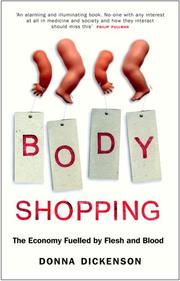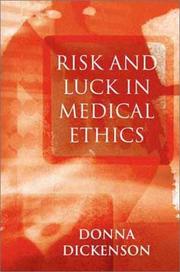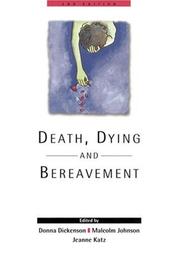| Listing 1 - 10 of 24 | << page >> |
Sort by
|
Book
ISBN: 9780231159746 9780231534413 0231159749 0231534418 Year: 2013 Publisher: New York, N.Y. Columbia University Press
Abstract | Keywords | Export | Availability | Bookmark
 Loading...
Loading...Choose an application
- Reference Manager
- EndNote
- RefWorks (Direct export to RefWorks)
Personalized healthcare-or what the award-winning author Donna Dickenson calls "Me Medicine"-is radically transforming our longstanding "one-size-fits-all" model. Technologies such as direct-to-consumer genetic testing, pharmacogenetically developed therapies in cancer care, private umbilical cord blood banking, and neurocognitive enhancement claim to cater to an individual's specific biological character, and, in some cases, these technologies have shown powerful potential. Yet in others they have produced negligible or even negative results. Whatever is behind the rise of Me Medicine, it isn't just science. So why is Me Medicine rapidly edging out We Medicine, and how has our commitment to our collective health suffered as a result? In her cogent, provocative analysis, Dickenson examines the economic and political factors fueling the Me Medicine phenomenon and explores how, over time, this paradigm shift in how we approach our health might damage our individual and collective well-being. Historically, the measures of "We Medicine," such as vaccination and investment in public-health infrastructure, have radically extended our life spans, and Dickenson argues we've lost sight of that truth in our enthusiasm for "Me Medicine." Dickenson explores how personalized medicine illustrates capitalism's protean capacity for creating new products and markets where none existed before-and how this, rather than scientific plausibility, goes a long way toward explaining private umbilical cord blood banks and retail genetics. Drawing on the latest findings from leading scientists, social scientists, and political analysts, she critically examines four possible hypotheses driving our Me Medicine moment: a growing sense of threat; a wave of patient narcissism; corporate interests driving new niche markets; and the dominance of personal choice as a cultural value. She concludes with insights from political theory that emphasize a conception of the commons and the steps we can take to restore its value to modern biotechnology.
Sociology of health --- Professional ethics. Deontology --- biotechnologie --- bio-ethiek (medische, biomedische ethiek, bio-ethische aspecten) --- Medicine, Preventive --- Patient-centered health care --- Biotechnology --- Precision Medicine --- Public Health Practice --- Social Justice. --- Common Good --- Justice --- Obligations of Society --- Good, Common --- Justice, Social --- Medical care --- Disease prevention --- Diseases --- Prevention of disease --- Preventive medicine --- Pathology --- Preventive health services --- Preventive medicine physicians --- Public health --- bioéthique (éthique médicale, biomédicale, aspects bioéthiques) --- Moral and ethical aspects. --- ethics. --- Prevention --- Individualized Medicine --- precisiegeneeskunde --- gepersonaliseerde gezondheidszorg --- médecine de précision --- soins de santé personnalisés --- Social Justice --- ethics

ISBN: 9781851685912 185168591X Year: 2008 Publisher: Oxford Oneworld
Abstract | Keywords | Export | Availability | Bookmark
 Loading...
Loading...Choose an application
- Reference Manager
- EndNote
- RefWorks (Direct export to RefWorks)
From the Publisher: "In Body Shopping, award-winning writer Donna Dickenson makes a case against the new-found rights of businesses to harvest body parts and gain exclusive profit from the resulting products and processes. To illustrate her case, she presents a series of compelling stories of individuals injured or abused by the increasingly rapacious biotechnology industry." Body Shopping offers a fresh, international, and completely up-to-date take on the evolving legal position, the historical long view, and the latest biomedical research-an approach that goes beyond a mere recital of horror stories to suggest a range of new strategies to bring the biotechnology industry to heel. The result is a gripping, powerful book that is essential reading for everyone from parents to philosophers, and from scientists to lawmakers-everyone who believes that no human should ever be reduced to the sum of their body parts.
General ethics --- Människokroppen --- Bioteknik --- Bioethical Issues. --- Human Body. --- Biotechnology --- Human body. --- etik och moral --- Moral and ethical aspects. --- etik och moral. --- Etik och moral. --- Algemene ethiek --- Body --- Medical ethics --- Plastic surgery --- Reproductive technology --- Female body --- Legislation --- Book
Book
ISBN: 0745613225 Year: 1997 Publisher: Oxford ; Cambridge Polity Press
Abstract | Keywords | Export | Availability | Bookmark
 Loading...
Loading...Choose an application
- Reference Manager
- EndNote
- RefWorks (Direct export to RefWorks)
Droits des femmes --- Emancipatie van de vrouw --- Emancipation de la femme --- Emancipation of women --- Femmes [Droits des ] --- Femmes--Emancipation --- Rechten van de vrouw --- Rights of women --- Vrouwen--Emancipatie --- Vrouwenemancipatie --- Vrouwenrechten --- Women's liberation --- Women's rights --- Women--Emancipatie --- Women--Rights of women --- Women --- Social conditions --- Legal status, laws, etc. --- Economic conditions
Book
ISBN: 1856280802 1856280810 Year: 1991 Publisher: Aldershot, Hants, England : Avebury,
Abstract | Keywords | Export | Availability | Bookmark
 Loading...
Loading...Choose an application
- Reference Manager
- EndNote
- RefWorks (Direct export to RefWorks)
Ethics, Medical --- Philosophy, Medical --- Medical ethics --- Ethique médicale --- Philosophy --- Philosophie --- Philosophy. --- Ethique médicale --- Ethics, Medical. --- Philosophy, Medical.

ISBN: 0745621465 0745621457 Year: 2003 Publisher: Cambridge, UK : Polity,
Abstract | Keywords | Export | Availability | Bookmark
 Loading...
Loading...Choose an application
- Reference Manager
- EndNote
- RefWorks (Direct export to RefWorks)
Ethics is commonly assumed to be the one realm in which luck and risk do not intrude. It has been said that 'While one can be lucky in one's business, in one's married life, and in one's health, one cannot, so it is commonly assumed, be subject to luck as far as one's moral worth is concerned.' But although we do not normally hold people responsible for outcomes beyond their control, a serious examination of the role of luck and risk may lead us to conclude that very few outcomes are really within people's control. This is the paradox of 'moral luck'. Risk and Luck in Medical Ethics examines the 'moral luck' paradox in greater detail, relating it to Kantian, consequentialist, and virtue-based approaches to ethics. Dickenson applies the paradoxes of risk and luck to medical ethics, including timely discussion of risk and luck in the allocation of scarce health care resources, informed consent to treatment, decisions about withholding life-sustaining treatment, psychiatry, reproductive ethics, genetic testing, and medical research and evidence-based medicine. The book concludes with an examination of the relevance of risk and luck in a medical context to the study of global ethics. If risk and luck are taken seriously, it would seem to follow that we cannot develop any definite moral standards at all, that we are doomed to moral relativism. However, Dickenson offers strong counter-arguments to this view that enable us to think in terms of universal standards for judging ethical systems. This claim has direct practical relevance for practitioners as well as philosophers.
Fortune. --- Medical ethics. --- Risk. --- Uncertainty. --- moraalfilosofie --- bio-ethiek (medische, biomedische ethiek, bio-ethische aspecten) --- risicomanagement (risico-evaluatie, risicobeheer) --- veiligheid --- geluk (onzekerheid) --- aansprakelijkheid --- verantwoordelijkheid (verantwoordingsplicht, verantwoording) --- ethiek (ethische aspecten) --- philosophie morale --- bioéthique (éthique médicale, biomédicale, aspects bioéthiques) --- évaluation du risque (gestion du risque) --- sécurité (principe de sécurité) --- chance (incertitude) --- responsabilité --- responsabilité (imputabilité, obligation de rendre compte) --- ethique (aspects ethiques) --- Fortune --- Medical ethics --- Risk --- Uncertainty --- Reasoning --- Economics --- Probabilities --- Profit --- Risk-return relationships --- Biomedical ethics --- Clinical ethics --- Ethics, Medical --- Health care ethics --- Medical care --- Medicine --- Bioethics --- Professional ethics --- Nursing ethics --- Social medicine --- Luck --- Opportunity --- Moral and ethical aspects
Book
ISBN: 9781107160774 1107160774 9781316613740 1316613747 9781316675984 1108216633 1108207189 131667598X Year: 2017 Publisher: Cambridge : Cambridge University Press,
Abstract | Keywords | Export | Availability | Bookmark
 Loading...
Loading...Choose an application
- Reference Manager
- EndNote
- RefWorks (Direct export to RefWorks)
We live in an era when all bodies are potentially 'feminised' by being rendered 'open-access' for biomedical research and clinical practice. Adopting a theoretically sophisticated and practical approach, Property in the Body: Feminist Perspectives rejects the notion that the sale of bodily tissue enhances the freedom of the individual through an increase in moral agency. Combining feminist theory and bioethics, it also addresses the omissions which are inherent in policy analysis and academic debate. For example, whilst women's tissue is particularly central to new biotechnologies, the requirement for female labour is largely ignored in subsequent evaluation. In its fully revised second edition, this book also considers how policies and developments vary between countries and within specific areas of biomedicine itself. Most importantly, it analyses the new and emerging technologies of this field whilst returning to the core questions and fears which are inextricably linked to the commercialisation of the body.
Biotechnology --- Human body. --- Feminist theory. --- Moral and ethical aspects. --- Human body --- Feminist theory --- Biotechnologie --- Corps humain --- Théorie féministe --- Moral and ethical aspects --- Aspect moral --- Droit --- Théorie féministe. --- Aspect moral. --- Droit. --- Feminism --- Feminist philosophy --- Feminist sociology --- Theory of feminism --- Body, Human --- Human beings --- Body image --- Human anatomy --- Human physiology --- Mind and body --- Philosophy

ISBN: 110712848X 1280160144 9786610160143 0511118171 113914622X 0511066538 051106022X 0511307896 0511545126 0511068662 9780511066535 0521662664 9780521662666 0521664748 9780521664745 9780511068669 9780511060229 9780511118173 9780511545122 6610160147 9781280160141 9780511307898 Year: 2002 Publisher: Cambridge, UK ; New York, NY, USA : Cambridge University Press,
Abstract | Keywords | Export | Availability | Bookmark
 Loading...
Loading...Choose an application
- Reference Manager
- EndNote
- RefWorks (Direct export to RefWorks)
This book brings together an unusually broad range of experts from reproductive medicine, medical ethics and law to address the important ethical problems in maternal-fetal medicine which impact directly on clinical practice. The book is divided into parts by the stages of pregnancy, within which the authors cover four main areas: • the balance of power in the doctor-patient relationship and the justifiable limits of paternalism and autonomy • the impact of new technologies and new diseases • disability and enhancement (the 'designer baby') • difference - to what extent should the clinician respect the tenets of other faiths in a multicultural society, even when the doctor believes requested interventions or non-interventions to be morally wrong? The aim throughout is to unite analytic philosophy and actual practice. This is an important text not only for clinicians involved in human reproduction, but also philosophers and lawyers.
Human reproductive technology --- Perinatology --- Medical ethics. --- Biomedical ethics --- Clinical ethics --- Ethics, Medical --- Health care ethics --- Medical care --- Medicine --- Bioethics --- Professional ethics --- Nursing ethics --- Social medicine --- Medicine, Perinatal --- Perinatal medicine --- Obstetrics --- Pediatrics --- Moral and ethical aspects. --- Moral and ethical aspects --- General ethics
Book
ISBN: 9085062829 9789085062820 Year: 2006 Publisher: Amsterdam Boom
Abstract | Keywords | Export | Availability | Bookmark
 Loading...
Loading...Choose an application
- Reference Manager
- EndNote
- RefWorks (Direct export to RefWorks)
Filosofe Donna Dickenson bekijkt een aantal bio-ethische kwesties (stamceltechnologie, dna-onderzoek) vanuit een feministisch perspectief. Via een concept van gebundelde eigendomsrechten werpt ze een dam op tegen het gevaar dat vrouwenlichamen, in de ratrace van het medische onderzoek, tot handelswaar worden gereduceerd.
Philosophical anthropology --- General ethics --- Human medicine --- 060 Filosofie --- Philosophy --- Body --- Medical ethics --- Book

ISBN: 0761968571 Year: 2000 Publisher: London : Sage,
Abstract | Keywords | Export | Availability | Bookmark
 Loading...
Loading...Choose an application
- Reference Manager
- EndNote
- RefWorks (Direct export to RefWorks)
Bereavement. --- Death --- Medical ethics --- Terminal care --- Social aspects
Book
ISBN: 1444155806 9781444155808 Year: 2012 Publisher: London Hodder Education
Abstract | Keywords | Export | Availability | Bookmark
 Loading...
Loading...Choose an application
- Reference Manager
- EndNote
- RefWorks (Direct export to RefWorks)
Stem cell research, animal-human hybrids, gene patenting - this book will help the reader make sense of these thorny issues from the cutting edge of biotech science, whose importance will only grow in years to come. Should we do what ever science lets us do? Bioethics: All That Matters, new developments in biotechnology like genetics, stem cell research and artificial reproduction arouse both our greatest hopes and our greatest fears. Many people invest the new biotechnology with all the aspirations and faith once accorded to religious salvation. But does everyone benefit equally from scientific progress? Commercialised modern biomedicine runs the risk of exploiting vulnerable groups, from Indian `surrogate? mothers to professional guinea pigs in drug research.Professor Dickenson argues that although we've entered new scientific territory, there's no need to jettison our existing moral sense. By discussing a range of real-life cases, she equips readers to make up their own minds on these important and controversial questions. Good science and good ethics needn't be contradictory.This accessible and concise book will appeal to both students and general readers, giving a fascinating introduction to a wide range of perspectives on Bioethics.
Bioethics --- Genetic engineering --- Medical ethics --- Ethics, Medical --- Genetic Engineering --- Biotechnology --- Moral and ethical aspects --- ethics
| Listing 1 - 10 of 24 | << page >> |
Sort by
|

 Search
Search Feedback
Feedback About UniCat
About UniCat  Help
Help News
News